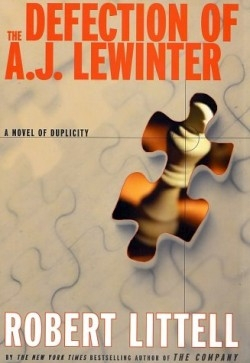The Defection of A.J. Lewinter
A Novel of Duplicity
What makes A.J. Lewinter run? That’s the question that both American and Russian intelligence agencies ask themselves in this Cold War thriller.
While attending an academic conference in Tokyo, American ceramic engineer Lewinter approaches the Russian embassy, declaring that he wants to defect. Convincing the ambassador that he has access to important American intelligence information about ballistic missiles that he wants to share with the Russian government, Lewinter is whisked away by the Russians. When the American intelligence agencies learn of his defection, the game begins.
In America, rough and worn CIA agent Leo Diamond, veteran of many high-profile espionage campaigns, must determine whether or not Lewinter has enough information to be harmful to the United States. Uncertain of the value of Lewinter information, Diamond hatches a plot that will both convince the Soviets that Lewinter’s information is worthless, and dispense with Lewinter altogether.
Worldly-wise KGB agent Yefgeny Pogodin heads up the Soviet examination of this American defector. Not entirely convinced that Lewinter can provide the information he claims he can, Pogodin finds himself caught in a deadly bind: he must convince his superiors that Lewinter does indeed have some valuable information, and he must deceive the Americans into thinking that the Soviets think Lewinter is a valuable catch. These two veterans and their teams of specialists become absorbed in a political chess match in which everyone—including Diamond’s girlfriend and Pogodin’s best friend—becomes a pawn.
When this novel was first published in 1973, it was hailed as “a perfect little gem,” and the author was described as the “American le Carré.” Almost thirty years later, his Cold War tale reveals the horrifying lengths to which intelligence and counterintelligence agencies will go in their quest for truth. Pogodin’s conversation with his best friend-whom he eventually kills in the name of espionage-reflects both Pogodin’s and Diamond’s feelings about the indecision and duplicity required by the spy game:
“‘The plain, simple, elementary fact is that I don’t know what to do … I’m really scared … Who is this Lewinter? I mean who is he really? … sometimes I wish to hell I’d never laid my eyes on him. I’ve never gotten involved in politics before … I guess I’m in over my head.’
‘Don’t let it worry you too much,’ Zaitsev shot back. ‘You’re in a place where that is the human condition.’“
Although the Cold War has passed, Littell’s novel remains instructive for a world where large agencies run rampant over individual liberties in the name of patriotism and homeland security.
Reviewed by
Henry L. Carrigan
Disclosure: This article is not an endorsement, but a review. The publisher of this book provided free copies of the book to have their book reviewed by a professional reviewer. No fee was paid by the publisher for this review. Foreword Reviews only recommends books that we love. Foreword Magazine, Inc. is disclosing this in accordance with the Federal Trade Commission’s 16 CFR, Part 255.

